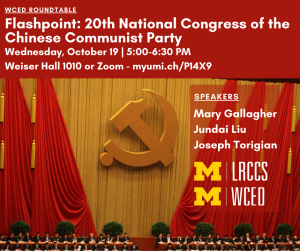Presented By: Center for Emerging Democracies
WCED Roundtable. Flashpoint: 20th National Congress of the Chinese Communist Party
Mary Gallagher, Jundai Liu, Joseph Torigian, Dan Slater (moderator)

The 20th National Congress of the Chinese Communist Party (CCP) is scheduled to open on October 16, 2022. 2,300 national delegates, representing the CCP’s estimated 90 million members, will convene in Beijing. For the first time since the death of Deng Xiaoping, leadership succession and term limits have again become uncertain. The 20th National Congress opens amid China’s continuing zero-COVID policy, slowing economy, and tightening political control, on one hand, and worsening U.S.-China relations and opaque China-Russia relations, on the other. Assembled when the closed-door meeting is still underway, the experts on this panel will share their insights into this historic event.
Mary E. Gallagher is the Amy and Alan Lowenstein Professor of Democracy, Democratization, and Human Rights at the University of Michigan where she is also the director of the International Institute. She was a foreign student in China in 1989 at Nanjing University. She also taught at the Foreign Affairs College in Beijing from 1996-97. She was a Fulbright Research Scholar from 2003-04 at East China University of Politics and Law in Shanghai, China. In 2012-13, she was a visiting professor at the Koguan School of Law at Shanghai Jiaotong University. Professor Gallagher is an expert in Chinese politics, law and society, and labor politics. Her most recent book is Authoritarian Legality in China: Law, Workers and the State, published by Cambridge University Press in 2017.
Jundai Liu is a postdoctoral research fellow at the Lieberthal-Rogel Center for Chinese Studies at the University of Michigan. She is currently working on a book manuscript that examines grassroots democracy in contemporary village China, drawing on longitudinal and comparative ethnography. Jundai received her PhD in sociology from Harvard University.
Joseph Torigian is an assistant professor at the School of International Service at American University in Washington. Previously, he was a Fellow at the Council on Foreign Relations, a Postdoctoral Fellow at Princeton-Harvard’s China and the World Program, a Postdoctoral (and Predoctoral) Fellow at Stanford’s Center for International Security and Cooperation (CISAC), a Predoctoral Fellow at George Washington University’s Institute for Security and Conflict Studies, an IREX scholar affiliated with the Higher School of Economics in Moscow, and a Fulbright Scholar at Fudan University in Shanghai. His new book, Prestige, Manipulation, and Coercion: Elite Power Struggles in the Soviet Union and China after Stalin and Mao was recently released with Yale University Press, and he has a forthcoming biography on Xi Jinping’s father with Stanford University Press.
This lecture will be presented in person in 1010 Weiser Hall and on Zoom. Webinar registration required at: http://myumi.ch/P14X9
If there is anything we can do to make this event accessible to you, please contact weisercenter@umich.edu. Please be aware that advance notice is necessary as some accommodations may require more time for the university to arrange.
Mary E. Gallagher is the Amy and Alan Lowenstein Professor of Democracy, Democratization, and Human Rights at the University of Michigan where she is also the director of the International Institute. She was a foreign student in China in 1989 at Nanjing University. She also taught at the Foreign Affairs College in Beijing from 1996-97. She was a Fulbright Research Scholar from 2003-04 at East China University of Politics and Law in Shanghai, China. In 2012-13, she was a visiting professor at the Koguan School of Law at Shanghai Jiaotong University. Professor Gallagher is an expert in Chinese politics, law and society, and labor politics. Her most recent book is Authoritarian Legality in China: Law, Workers and the State, published by Cambridge University Press in 2017.
Jundai Liu is a postdoctoral research fellow at the Lieberthal-Rogel Center for Chinese Studies at the University of Michigan. She is currently working on a book manuscript that examines grassroots democracy in contemporary village China, drawing on longitudinal and comparative ethnography. Jundai received her PhD in sociology from Harvard University.
Joseph Torigian is an assistant professor at the School of International Service at American University in Washington. Previously, he was a Fellow at the Council on Foreign Relations, a Postdoctoral Fellow at Princeton-Harvard’s China and the World Program, a Postdoctoral (and Predoctoral) Fellow at Stanford’s Center for International Security and Cooperation (CISAC), a Predoctoral Fellow at George Washington University’s Institute for Security and Conflict Studies, an IREX scholar affiliated with the Higher School of Economics in Moscow, and a Fulbright Scholar at Fudan University in Shanghai. His new book, Prestige, Manipulation, and Coercion: Elite Power Struggles in the Soviet Union and China after Stalin and Mao was recently released with Yale University Press, and he has a forthcoming biography on Xi Jinping’s father with Stanford University Press.
This lecture will be presented in person in 1010 Weiser Hall and on Zoom. Webinar registration required at: http://myumi.ch/P14X9
If there is anything we can do to make this event accessible to you, please contact weisercenter@umich.edu. Please be aware that advance notice is necessary as some accommodations may require more time for the university to arrange.